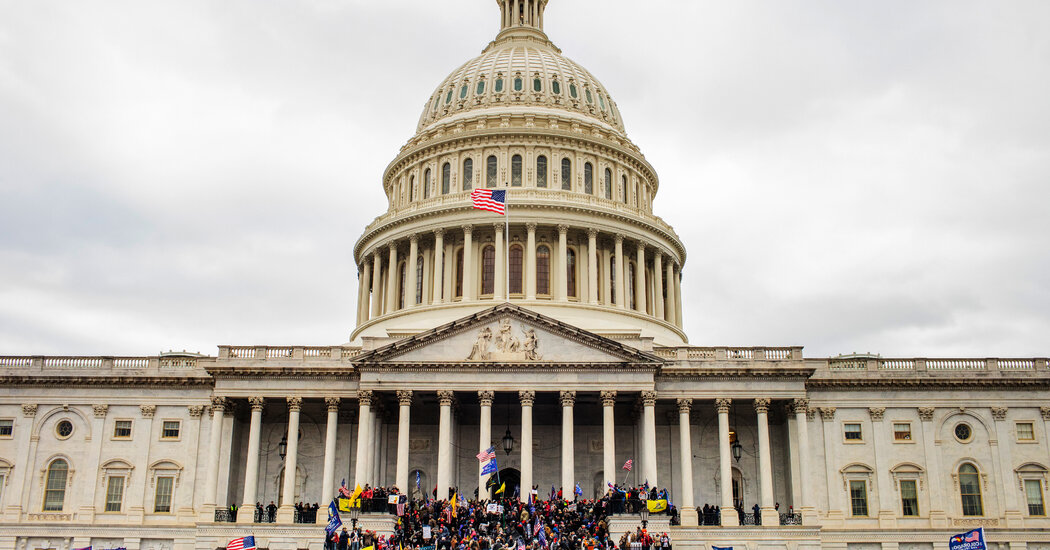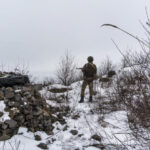
Prosecutors have provided a revealing glimpse of their strategy for the first trial stemming from the attack on the Capitol, unveiling an inventory of the extensive evidence they intend to introduce, including surveillance videos, police communications, text messages, geolocation data and testimony from a Secret Service agent and the defendant’s own children.
The defendant in the trial, set to begin on Feb. 28, is Guy Wesley Reffitt, an oil industry worker who prosecutors say was a member of the Texas Three Percenters, a far-right group connected to the gun rights movement. Mr. Reffitt stands accused of storming the Capitol with a pistol at his waist. The charges against him include interfering with law enforcement officers during a civil disorder and obstructing Congress’s duty to certify the results of the 2020 election.
The trial — the earliest of several related to the events of Jan. 6, 2021, scheduled this year — will mark a major turning point in the Justice Department’s vast investigation of the Capitol attack. About 200 people have pleaded guilty so far to charges connected to the violent assault that disrupted the peaceful transfer of power. Of those, nearly 90 have already been sentenced.
The Reffitt trial, which will take place in Federal District Court in Washington, is expected to be the first time that prosecutors will publicly offer evidence of the allegations they have made against scores of other similar defendants. Under what is sure to be enormous scrutiny, the prosecutors will have to demonstrate that law enforcement officers were “adversely affected” by the riot and that Mr. Reffitt was part of a pro-Trump mob that illegally stopped the work of Congress.
To that end, the prosecutors have amassed an expansive array of witnesses and evidence, according to the list they filed Monday night. While much of the information they plan to introduce had been revealed in previous court papers and hearings, some of it was new, suggesting that they may have similarly undisclosed evidence waiting in the wings for future trials.
Mr. Reffitt’s lawyer, William L. Welch III, did not respond to a request for comment on the government’s evidence, but his client has openly pushed back against accusations that he took part in anything untoward at the Capitol on Jan. 6. In a letter obtained by ProPublica last spring, Mr. Reffitt wrote of the attack, “There was no insurrection, no conspiracy, no sinister plan and no reason to think otherwise.”
While Mr. Reffitt’s trial is certain to attract attention for being the first, other larger and more complicated trials are tentatively scheduled for later in the year. Four leaders of the far-right nationalist group the Proud Boys are set to go on trial in Washington in May. And in July, prosecutors plan to try 11 members of the Oath Keepers militia — including its leader Stewart Rhodes — on charges of seditious conspiracy.
The Reffitt trial is likely to begin with an overview of the tumult on Jan. 6 offered by an officer who worked that day at the U.S. Capitol Police’s command center, overseeing a video surveillance system, and radio and phone communications, prosecutors said. The officer will “explain the progression of the riot” through a compilation of surveillance videos from both inside and outside the building and will show the jury a separate video of former Vice President Mike Pence’s motorcade leaving the east plaza of the Capitol at 1:57 p.m.
Three other Capitol officers are scheduled to testify about their direct interactions with Mr. Reffitt and others members of the mob, prosecutors said. These officers are expected to describe their experiences trying to control the crowd by firing pepper balls and other projectiles and to give accounts of failing to subdue Mr. Reffitt and his fellow rioters with chemical spray.
Much of the government’s evidence came from search warrants executed on Mr. Reffitt’s property. Prosecutors say, for instance, that they have geolocation data from an app on Mr. Reffitt’s iPhone that pinpoints his precise movements before, during and after the attack. They also say they have extracted from the phone several threads of messages he sent and received by text and via the chatting app Telegram.
Prosecutors are in possession of a 31-minute video that Mr. Reffitt apparently took during the riot with a panoramic camera. They also say they have another video, nearly two hours in length, entitled “Texas State Meeting — Zoom,” which may be of an online event hosted by the Texas Three Percenters that Mr. Reffitt attended.
Among the other witnesses set to testify at the trial are a Secret Service agent and a former counsel to the Secretary of the Senate.
The agent intends to describe “emergency actions” taken on Jan. 6 to protect Mr. Pence and to show the jury a video of the former vice president and others hurrying down a staircase after rioters breached the building. The Senate aide will explain the certification of the Electoral College vote that was disrupted by the riot, a central part of the prosecution’s case that Mr. Reffitt and others obstructed the work of Congress.
Prosecutors also revealed the existence of a new witness: a member of the Texas Three Percenters who traveled with Mr. Reffitt to Washington. The witness, who is known for now only as R.H. was granted immunity against prosecution, will testify about the preparations the two made for their trip, including the firearms and tactical gear that Mr. Reffitt brought with him, prosecutors say.
Perhaps the most emotional witnesses to testify at the trial will be Mr. Reffitt’s teenage son and daughter.
Prosecutors say the son, who was 18 at the time of attack, will tell the jury that he and his sister, then 16, spoke with their father when he returned from Washington after the riot and that Mr. Reffitt threatened to shoot them if they went to the F.B.I. about him. In a previous court hearing, the daughter testified that Mr. Reffitt threatened to put a bullet in her cellphone if she posted about him on social media.




